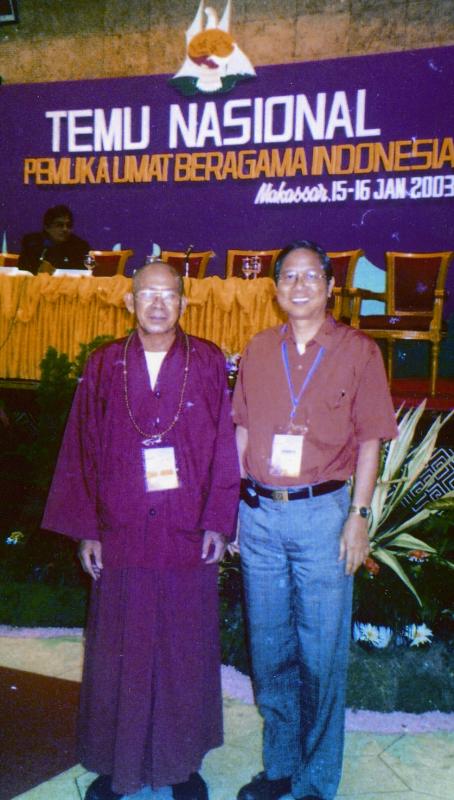Inter-Religious Dialogue In Indonesia
By Father Ernesto Amigleo CICM
Fr Bert Layson’s article, ‘Peace Process,’ January-February 2004, based on a talk he gave in Bali, Indonesia, in May 2003, evoked a response from Cathleen E. Caga-anan, a student in Manila which, with another article by Father Bert, inspired this article from a Filipino missionary in Indonesia.
Fr Ernie with a Buddhist monk at a National Seminar on Inter-Religious Dialogue
‘When a Muslim saved a Christian’ by Fr Bert Layson OMI and ‘A Student’s Letter to Fr Bert’ by Cathleen E. Caga-anan in the July-August 2004 issue have inspired me to write something about our efforts at the University of Atma Jaya, Makassar, Indonesia, to promote inter–religious dialogue.
After a four-year stint as Director of Novices for our CICM Indonesian candidates, I was appointed to the Catholic University of Atma Jaya in 1999 as chaplain and lecturer.
Quite a distance from the city, the campus of Universitas Atma Jaya is an ideal site for study and concentration. Founded in 1980 by a group of dynamic laypeople, its vision is to give students a proper academic, scientific and technological education imbued with the gospel values of love, justice, truth and respect for human life and dignity. Its mission is to develop academic excellence, professionalism, moral and personal integrity in the whole academic community.
The university has 2,300 students and 200 faculty members and employees. There are four faculties: Economics, Engineering, Law and Agriculture.
Inter–Religious Dialogue
Although the university is Catholic, only 40 percent of its students are Catholics. This represents the present reality in the city of Makassar where Catholics are a minority. The other 60 percent of students, and some lecturers and employees, include Muslims, Hindus, Buddhist and Protestants. Our present rector is a Protestant. Seen from this perspective alone the university is an ideal place to promote and foster the spirit of Inter-Religious Dialogue.
As a missionary where people of many faiths are interacting, often with misunderstanding, conflict and violence, Inter-Religious Dialogue is one of my main concerns. It is what has challenged and motivated me to accept the task of university chaplain. Although I’m Vicar General of the Archdiocese of Makassar since 2003, the Archbishop has allowed me to continue my ministry in the university, for which I am grateful and happy.
In the university we hold a yearly live-in three-day seminar for university students with the theme of Inter-Religious Dialogue. Our aim is for the participants to share their faith and grow in mutual understanding with one another. It is also to help them see God’s love extended to people of different faiths so as to be more aware of the fact that in diversity there is unity and that in God’s eyes we are all brothers and sisters despite our differences. Our differences are gifts from the Lord to be shared and celebrated.
At first, we limited ourselves to our own students. But our positive experience encouraged us to invite students from neighboring universities and colleges. This has proven to be better because as our own students socialize and interact with other students from outside – hence building up relationships with people of other faiths – the other students benefit greatly from the lessons gained throughout the seminar.
The seminar consists of getting to know each other, praying together, sharing of experiences, input from resource persons representing Islam, Buddhism, Hinduism, Protestantism and Catholicism. It is interesting to discover how ignorant many of the participants are about other faiths. The seminar broadens their understanding not only of their own faith but also that of others. The most interesting part of all is a whole day when we visit various temples, churches and mosques. They enjoy most of all seeing the interior of each other’s houses of prayer. In each, someone explains the doctrine of the particular faith and some of its sacred symbols.
It inspires me to see from the participants’ reactions how much the seminar helps them become more open in their attitude towards other faiths. As one said to me, ‘Before the seminar, I used to have many prejudices towards religions not my own; but after, these prejudices are corrected. I believe that fundamentally we are all God’s children and brothers and sisters of one another.’
In the university campus we also hold a prayer for peace in the auditorium. Student representatives from the different faiths are invited to say a prayer according to their religion. Many students, faculty and employees attend. I also invite students of different faiths to take part in the Graduation Mass. Dressed in their different religious garb, they bring gifts for the offering, after which each says a prayer. Then I bless them by laying my hands on their heads. These small attempts, I am glad to say, receive a positive response from the student-body.
Hopes for the Future
My hope is that inter-religious dialogue and harmony may find a real place in the hearts of our students, faculty and employees. Thanks be to God, our university is one of its promoters, although we are conscious of the need to promote it further. This is the challenge of our times, especially in our local context where for the last few years this country has been besieged with ongoing religious conflicts. It is my hope and prayer that our small but significant activities in the university may contribute to the overall promotion of peace, religious understanding and harmony in Indonesia.
You may contact Father Amigleo at frernie2001@yahoo.com or at Jl. Sudirman 48, MAKASSAR, INDONESIA.

